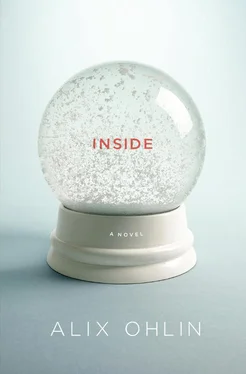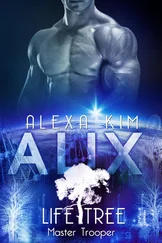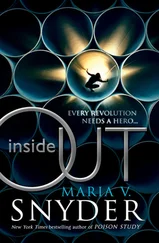She licked the salty residue of the egg rolls off her fingers. She had a photo shoot in the morning and knew she’d get in trouble; too much salt made her lids puffy and gave her skin a creped quality. But maybe she wouldn’t do the photo shoot. Maybe, she thought with a smile, she wouldn’t go back at all.
She didn’t return to the hotel until midnight, and she threw a blanket over the blinking red voice-mail button on the phone and went to sleep. In the morning, she took a cab down to Tribeca for her photo shoot, where her late arrival earned her a cursory, halfhearted scolding from the publicist. They were used to this kind of thing. They dressed her up in a variety of outfits — a spy, an executive, a nurse, and the president of the United States, if the president were very young and a little bit slutty.
The lights beat hot on her face and people were yelling instructions and a woman kept oiling her cleavage, then dusting it with sparkly powder.
Amid the hubbub she became aware, after a while, that Adam was standing in the back, watching with a lazy, proprietary interest. An hour later, he came up as she was removing the many layers of makeup. Her fake eyelashes felt exoskeletal, and she peered at him through their spiky, bristled edges. Outside of L.A. his posturing looked even more ridiculous, his tan incongruous, his teeth strangely uniform, plastic.
“That was hot,” he said. “You’re going to do fine.”
“Why are you here?”
“The show’s going off the air,” he said. “It underperformed.”
He had arranged his features into an expression not of concern or reassurance, or even of a readiness to listen and explain, but of complete neutrality. Don’t blame me , it said. You’re on your own .
“So that’s it?” she said.
He put a hand on her bare shoulder. “I should’ve canceled the shoot, but there’s this little fucker at the magazine that I’ve been waiting to get back at for years. So now they’ll have to eat the cost. I’m glad you showed up. I thought maybe you were on a bender or something.”
“I don’t do that,” Anne said mechanically. She was out of her pinstriped miniskirt now and slipping on her jeans.
“No, you’re a wholesome girl,” Adam said. “Good luck.”
She cabbed it back to the hotel, where her room had been tidied, her clothes folded, the toiletries replaced. She took a long bath, her skin pruning. When she got out, her cell phone was beeping. There were two messages: the first from Julia, who almost sounded like she was crying. She was sorry about the news, she said, but while she understood that Anne might be upset, the time to get back on the horse was now. It was the most sympathy Anne had ever heard from her, and she was surprised. The second message was from Hilary — there was no doubting the tears in her voice — begging for Anne to call back.
She deleted Julia’s message and listened to Hilary’s again. The baby was making noises in the background, and she thought about the baby she’d seen on the street outside her apartment, staring back at her, curious and unafraid. But Hilary’s baby was in a small town that Anne couldn’t picture and would never see.
Suddenly she was crying too, the short, dry sobs shaking her all over, her body shivering involuntarily. There was no one to go to or run away from. What had Neal said — that if you have nothing to mourn, then nothing in your life’s worth anything?
She was dangling at the end of her particular tether.
She spent an hour like that in the dark, sterile room, and she felt dismantled. Ended.
Okay, she finally thought. Okay.
So everything was over, the short wild ride. She called her landlord in L.A., broke her lease, and told him to sell whatever was left, which wasn’t much. She decided that today she would do one good thing. She rooted around in her purse and wrote out a check to Hilary for the entire amount she’d earned from the TV show, more money than she’d made in her entire life and far more, she was sure, than Hilary had ever imagined. She put the check in an envelope, added the address in Utica, and left it with the concierge to mail.
When she checked out, she was carrying a single bag that was no bigger than the one she had had when she first got to New York. Rinsed of all her trappings, she felt lighthearted and at ease. For years she had been escaping into one life after another, and this wasn’t the time to stop. People like Hilary and Alan were only temporary runaways. They would always go home; they belonged to the place they came from. Other people were destined to keep leaving, over and over again.

Montreal, 1996
GRACE DEBATED FOR DAYS whether to even make the trip. What did she expect? She turned it over in her mind, picturing the bestand worst-case scenarios. Eventually she decided to go, because at least she would stop thinking about it and be reckoning with something real.
Tug had never talked much about his hometown or his life there. When Grace spoke of her childhood, which came up naturally every now and again, he’d nod and listen but only rarely reciprocated with stories of his own. Looking back, she understood that this elusiveness had been part of his appeal; he withheld himself, and kept her wanting more.
Knowing this didn’t mean she had stopped feeling that way.
At the funeral, she had stayed in the back and watched his parents — well-dressed, quiet-looking people, his mother in glasses, his father balding, slightly stooped — navigate the service. They didn’t know who she was, or even that she existed, and she wasn’t about to introduce herself then. Perhaps this wasn’t an appropriate time either, but she couldn’t help wanting to go.
The drive to Brantford wound through farm country, with silver silos and red barns and cows here and there. The day was gray and drizzly. Grace felt a tightening in her chest, her heart seized by the dreary prettiness of the landscape. She crossed from Quebec into Ontario, the farms neat and well tended, the fruit trees black in the rain. Things Tug would never see again.
Feeling sick, she stopped at a gas station and let her stomach empty itself out, as if some interior part of her wanted to escape. Afterward, she sat in the car with the wipers on, their rhythmic sweep soothing her. It was Saturday. There was nowhere she had to be.
Tug’s parents were listed in the phone book, and she pulled up in front of a two-story house, red brick with black shutters, as well kept as the farms she’d passed. His father was a retired chemist; his mother had never worked outside the home. In the years Tug had been abroad, they had always stayed in Brantford, rarely traveling. “They never wanted to see the world,” Tug once said, and the disapproval in his voice rang clear. Now that she’d arrived, Grace was tempted to turn around and drive back to Montreal. Maybe all she’d wanted was to see the childhood home of a man she’d loved, to know that it still existed, some remnant of him in the world.
A woman in a yellow rain slicker walked her dog past the car, frowning in the few seconds she looked at Grace. It wasn’t the kind of neighborhood where you could just sit in a car without attracting notice. Everybody here must know everybody else, and which cars they drove. Still, she didn’t move. In the warmth of her car, an exhaustion came over her that was strangely close to contentment. Was this enough? Had she already gotten what she’d come for? She turned on the radio, leaned back in her seat, and closed her eyes. The CBC was playing opera, and a woman’s voice tripped light and high through an aria Grace didn’t recognize.
Читать дальше













